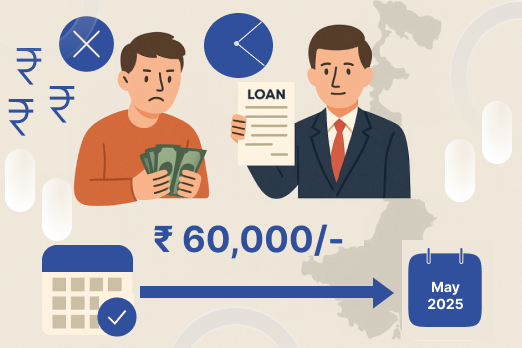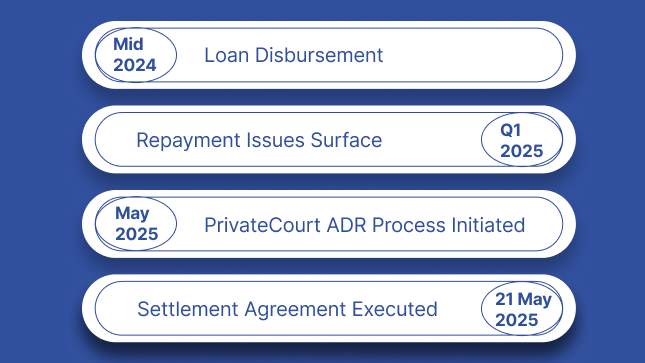Introduction
In the trading sector, where cash turnover is frequent and payment cycles are short, even minor disruptions can lead to missed financial commitments. This case involved a borrower operating a trading business who defaulted on loan repayments due to a cascade of delayed receivables. With limited room for prolonged litigation, the lender turned to PrivateCourt to find a structured, enforceable alternative. Leveraging its digital-first, neutral ADR system, PrivateCourt enabled a three-part repayment plan that closed the dispute efficiently and professionally.

Dispute Snapshot
The respondent ran a sole proprietorship trading firm that dealt in wholesale goods, relying on regular client orders and cyclical payments to sustain operations. A business loan was sanctioned to expand warehousing and inventory turnover. However, an unanticipated slump in client renewals and delay in receivables soon caused financial pressure. With a pending loan amount of Rs. 60,000, the borrower had no plan in place. The lender, seeing the risk of full recovery slipping, invoked PrivateCourt’s ADR clause to initiate a mediated closure.

The Journey to Default
The borrower had been operating with thin profit margins, relying heavily on predictable client behavior. As business slowed and cash flow narrowed, repayments became irregular. Despite verbal assurances and follow-ups, no payment structure emerged. The lender realized the need for structured intervention and escalated the case to PrivateCourt. The neutral tone and supportive structure of the PrivateCourt process helped the borrower come forward with a clear proposal: repayment of the Rs. 60,000 in three instalments. This moved the conversation from confrontation to collaboration, restoring clarity on both sides.

Timeline of Key Events
| Date | Event |
|---|---|
| Mid 2024 | Loan Disbursement |
| Q1 2025 | Repayment Issues Surface |
| May 2025 | PrivateCourt ADR Process Initiated |
| 21 May 2025 | Settlement Agreement Executed |

Documentation and Submissions
- Sanctioned loan agreement and repayment schedule
- Ledger of default payments and communication logs
- Consent for ADR initiation
- Settlement draft outlining proposed instalments
- Digitally signed agreement via PrivateCourt platform

The ADR Process Facilitated by PrivateCourt
PrivateCourt’s digital mediation platform arranged a virtual session where both parties could present their positions transparently. With a qualified mediator overseeing the process, the borrower proposed a repayment plan in three equal instalments of Rs. 20,000 each. The lender agreed, provided terms were formally documented and a breach clause was embedded. All communication and negotiation steps were managed and archived by PrivateCourt. The first instalment was committed to be paid by 26 May 2025, with the remaining to follow within the agreed timeframe.

Final Award (Dated: 21 May 2025)
- Settlement Amount: Rs. 60,000/-
- Payment Plan: Three instalments of Rs. 20,000 each
- Initial Due Date: 26 May 2025
- Penalty Clause: Full amount revivable with 18% interest upon breach
Final Insights
This case illustrates how structured dialogue can turn uncertain defaults into assured recoveries when professionally facilitated. PrivateCourt’s platform created an environment where both parties could engage constructively and arrive at a solution that was financially manageable and legally enforceable. In a landscape where delayed payments often snowball into long-term disputes, the role of a credible ADR provider like PrivateCourt becomes essential—not just for dispute resolution, but for maintaining commercial integrity.
keywords:Loan Default, PrivateCourt, Trading Sector, ADR, Instalment Settlement, Digital Mediation, Dispute Closure
